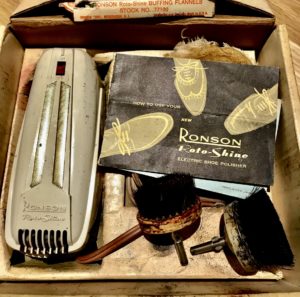You have no items in your cart. Want to get some nice things?
Go shopping
My nephew and his bride exchange vows by the sea under a burning July sun. They are pale
silhouettes to those of us on his side of the aisle, who must gaze directly into the brilliance. I
look down for relief and see my late father standing over me, the two of us mirrored in my glossy
dress shoes like an afterimage. Instantly I fast-forward to a familiar concern: what will befall his
old Roto-Shine Electric Shoe Polisher when I am gone? The anxiety passes in time for “I do.”
Rise and SHINE…the quick, easy economical way, with the modern polisher that keeps shoes
store-bright. Say goodbye forever to polish-stained hands and after-shine mess!
My mother might have thrown out the Roto-Shine, along with its instruction manual’s cheery
exhortations. She saved vintage letters or photos, as these signified people and people mattered
to her most. But a working 1930s radio, ornate playing cards from Habsburg Vienna,
indestructible metal toys from Germany, or a sturdy machine bearing brown and black smudges
were for the most part inanimate stuff to her.
To me, objects represent the people who bought, held, designed, manufactured, used, and
enjoyed them. All of the above items and more wait in my closets, growing older and for me,
ever more dear. My mother’s lack of sentimentality towards them baffled me, although I envied
her lightness: she never pondered the Roto-Shine’s fate. Then again she never used it, and there
is the bigger question of whether it is truly inanimate.
We live in discordant times. We seem unwilling to agree with or even hear each other, but on the
same Web in whose hermetic corners opinions coalesce and reverberate, there is a site devoted to
vintage razors. Its members come from across America and around the world. Heirlooms are
utterly egalitarian, and two people who concur on nothing else may be equally delighted by an
Enders Speed Shaver, its jade-green handle a miniature Art Deco masterpiece. I still have my
father’s 1940s-era version, likely the first razor he used, and when I someday must find a home
for it, there will surely be one in The Shave Den.
My Roto-Shine still lives in its original corrugated home. The cover bears a stylized image of the
machine and a shoe, the sides extol roto-shining’s benefits: Fastest! Easiest! Shiniest! The polisher itself is a streamlined block the size of three stacked TV remotes, with a cream-colored
upper and chestnut-brown lower housing. Underneath is a socket into which circular brushes and
buffers get inserted, on top two long gold chevrons are purely decorative. If Apple had existed in
1962, the machine would be the iPolish. Even doing nothing, it looks cool.
Roto-Shine leaves leather soft and gleaming – and you never have to touch the polish!
It is strikingly heavy for its size, which suggests solid construction inside the hard plastic shell.
The latter feels as if it could fend off a hammer blow, which makes me curious about the
bandage of black electrical tape on its underbelly. I imagine a barked curse and a fall from my
father’s hand to the concrete floor of our basement. There was a low stool on which he sat while
working, and where I perched too after he taught me the craft one year.
I don’t remember when or why I learned to polish shoes. We moved into our house when I was
nine. The Roto-Shine has a voice, a friendly trill that starts low as it comes up to speed, then
oscillates as it travels over leather. I may have heard it sing one day and gone down to watch my
father. He would have welcomed me, as he encouraged curiosity towards all things except, like
many Holocaust survivors, himself. He liked machines and tools, and doubtless took pleasure in
operating the Roto-Shine and admiring the results it produced.
Mirror-bright shoes, every day…the Ronson Roto-Shine way!
I used brown polish disproportionately when working on his shoes for him. He was a humanities
professor whose outfits tilted towards academic earth tones, not Wall Street blues or blacks. I
don’t recall whether he paid me for polishing, as he did for lawnmowing or painting. If I toiled
for free, there was compensation even so, in his approval and even more so the thrill of work
well done. He would inspect the finished shoes, laid out on newspaper to protect the floor, and
proclaim them good. Pride in quality is a trait worth far more than the dollar he might have given
me: he got shiny shoes, and I got a life lesson in the value of effort.
The day before my nephew’s wedding, I spread the Boston Globe across the floor. On what will
we work when all newspapers go fully online? The pop of the Kiwi can echoes down a half-
century, the petroleum scent of the black paste inside is a Proustian olfactory journey. When I
turn on the polisher, I hear it sing from a basement long ago. I drift blatantly in nostalgia until
my straight-tip shoes, nattily parallel-laced, glow like anthracite. I switch off the machine, its
motor spins down and then the anxiety comes. The Roto-Shine operates flawlessly, resisting
senescence, but the same cannot be said for me. I may wear out before it does. What then?
Rugged, long-life motor housed in high impact, light weight plastic case. Motor lubricated for
life. A penny a shine, with the amazing new Roto-Shine shoe polisher!
There is nothing convergent or multi-purpose about the Roto-Shine. Its electronics put it in the
modern category of device, its specialized function into that of a simple tool. Its sole purpose is
the speedy restoration of scuffed footwear to its original glow. It has never done anything else, it
continues to do this perfectly and likely will for as long as anyone cares to use it. And as I
discovered one day ten years ago, its lifespan coincides almost precisely with mine.
My father was an exacting man whose comfort in routine was indistinguishable from pleasure.
This was partly inherited from his own father, who when bedridden for days after a cancer
operation, apologized to a visitor for being unshaved. My father’s meticulousness likely also
came from being forced to leave his boyhood home of Vienna after the Germans marched in.
When you are eight and the elemental structure of life shatters, the subsequent need to re-
establish order in every area of it, however small, does not seem so unreasonable.
Guarantee Card A156744. Ronson Corp, 60 Park Place, Newark 2, NJ. Bought May 18, 1962. I
read my father’s distinctive handwriting, the letters resolutely vertical, with no forward slant to
suggest time pressure or capitulation to ease. The penmanship of a man determined to maintain
control. The note is written inside the instruction booklet, with the corresponding blue warranty
card folded into the overleaf and filled out by typewriter. Purchased May 18, 1962. A decade
ago I discovered the instructions and card under a flap in the box, and realized my father
received the Roto-Shine for his 31st birthday, nine days before my birth.
In a photo from my nephew’s wedding day, I stand on a dock in my suit and tie beside him and
his bride. The tips of my shoes catch the seaside sun with a reflected twinkle, a Roto-Shine
moment if there ever was one, preserved in the invisible digital cloud.
Select the proper Roto-Brush. Use black bristle brush when polishing black shoes, natural bristle
brush for brown or light shoes. Insert Roto-Brush into Snap-in Socket.
My shoes sparkled in the sun because I had followed the instructions. My father’s instructions,
that is, which had unsurprisingly repeated the official ones to the letter. Many find they have best
control of Roto-Shine with hand up front and forefinger pointing down toward red ejector tab.
According to this advice for holding the Roto-Shine, I belong to the many. My father comes near
enough in memory now for me to smell his Yardley aftershave, and see his hand tanned by
garden work guiding mine as we both hold the Roto-Shine the proper way.
What delight that moment of father-son intimacy must have given him. I will never experience
this from his perspective, having never had children. Regret may be a clear exercise in futility, as
the wish to change the immutable is by definition a non-starter, but it can also lead one to the
deepest possible comprehension of loss. If so, regardless of the associated pain, then regret
means feeling on a level unreachable by any other path, and discovering an otherwise untapped
emotional reservoir in one’s own heart.
Hold Roto-Shine lightly. Then, smoothly and easily Super Buff shoes to a high gloss. DO NOT
PRESS – let Super Buff do the work for you! The lighter the touch…the higher the gloss.
Life lessons hide around unexpected corners. No doubt my father, whose authoritarian side was
fond of proscriptions, emphasized the warning not to press. The lesson stuck, and that day before
the wedding, I let the Super Buffer’s whirling pad dance across my shoes powered only by its
own weight. How many actions and relationships benefit from light pressure, or none at all? I
recall times when I did not press and life shone brightly, as well as when doing the opposite
dulled its surface. The former handily outnumber the latter.
At 60, the Roto-Shine operates as if purchased yesterday, and there is reason to believe it will
do so at 90. In considering our respective futures, I find myself far more concerned about the
Roto-Shine’s. What happens to me will happen; I cannot control it. But the thought of the Roto-
Shine, still nestled in its box, landing with a hollow thump in a dumpster is unbearable.
Inanimate? I imagine the still-useful machine there in the dark, upside-down and surrounded by
trash, wondering how its decades of perfect service led to such an ignominious end.
Do not press. I cannot assume anyone will feel what I do as they heft the Roto-Shine or hear its
sweet song. No one else knows its history, and only I felt my father’s warm body against mine as
he taught me the care of good shoes. Perhaps one day I can show the device to my nephew, his
children, my niece, her family, or a friend’s grandchild. Perhaps that special someone will
instinctively appreciate gleaming footwear, or be an old soul with a natural reverence for the
vintage and functional. Perhaps there is a Shoe Den as well as a Shave Den, and I will find a
delighted buyer online. The comforting resonance of heirlooms is timeless and near-universal,
and one never knows when a moment of connection will occur. If and when it does, I will come
as close as I possibly can to that intimate father-son moment.
There is still hope for the amazing Roto-Shine, which according to the warranty card, when
properly cared for will serve its owner for years.

Geoff Kronik
Geoff Kronik lives near Boston and has an MFA from Warren Wilson College. His fiction and essays have appeared in Salamander, the Lancet, SmokeLong Quarterly, Opium, the Boston Globe and elsewhere.




